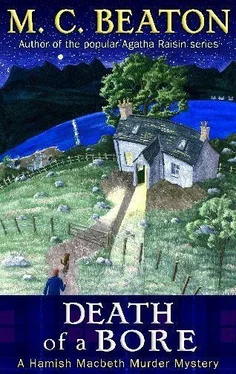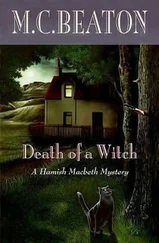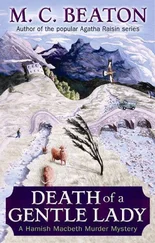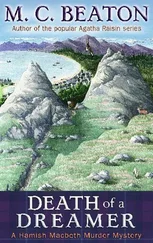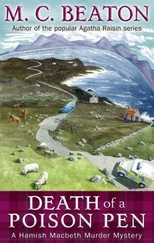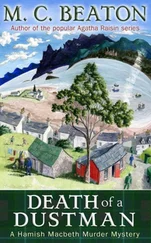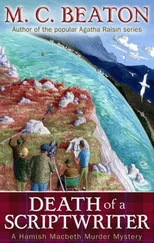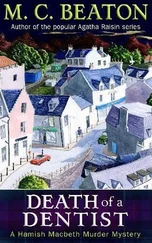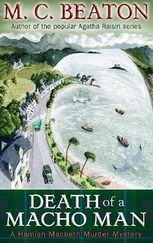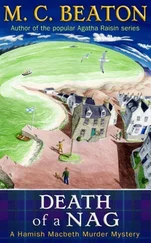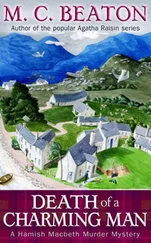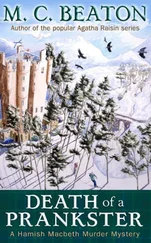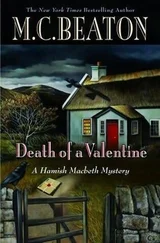“If you say so. I wish Blair hadn’t literally bullied that secretary to death.”
“It definitely was suicide?”
“Oh, yes, she left a very clear suicide note, typed on her computer, blaming Blair.”
“It was a suicide note? I mean, it wasn’t the draft of a letter she meant to send to the newspapers or police headquarters?”
“Yes, of course.”
“Can you tell me exactly what it said?”
“I’ve got a copy somewhere. Have you any coffee? And a brandy would go nicely with it.”
Hamish went through to the living room and rummaged in a cupboard by the fire. There was a bottle of brandy that someone had given him two Christmases ago. He was just straightening up from the cupboard when Heather appeared in the living room. “It’s more comfortable in here,” she said. “Why don’t you light the fire?”
“I haven’t lit a fire in here in ages,” said Hamish. “I think the chimney needs to be swept.”
“Oh, I’m sure it’ll be all right. Light the fire and make the coffee, and then I’ll show you the letter.”
I wonder if marriage would be like this, thought Hamish sulkily. But he retreated to the kitchen and put the kettle on to boil. Then he returned to the living room and put kindling and paper on the fire and, when it was burning, added slabs of peat.
When she was seated with a tumbler of brandy – she had poured it herself – she rummaged in her capacious handbag and produced a black notebook. “Here we are. She said, ‘The bullying of that man Blair is more than I can stand. The police brutality has shocked me. I’m getting out of this. You should be sorry but you won’t be sorry.’”
“And that’s it!” exclaimed Hamish. “Did she sign it?”
“No, but she cut her wrists in the bath, and the note was left on the floor beside the bath.”
“Who did she mean by ‘you’?”
“The world in general, I suppose.”
“She had been having an affair with her boss, Harry Tarrant, and I think she might have been having an affair with John Heppel as well. What was the toxicology report?”
“I haven’t had the autopsy report yet. Too soon. What are you getting at?”
“Our murderer tried to make John Heppel’s death look like suicide in a clumsy and amateurish way. Maybe he’s got a bit more expert. I mean, that could have been a draft of a letter. How was the paper? Had it been cut top or bottom?”
“Why?” Heather reached forward and picked up the brandy bottle and filled her tumbler.
“Well, just suppose she’s writing a letter on her computer and prints it off. Say someone drugs her and alters the letter so that all that appears is what you’ve got. No ‘Dear’ anybody or address.”
“You’re wandering in the realms of fantasy, Officer.”
“But was her computer checked? They forgot about John Heppel’s computer.”
She went through to the kitchen. Hamish heard her talking rapidly on her mobile phone.
Heather came back. “They say there’s no sign of the note she typed, but why would she save it? Anyway, to humour you, I told them to get an expert to recover what he can from the hard drive.”
“And how long will that take, ma’am?”
“Forever and a day. It’s being sent down to Glasgow. That fire looks as if it’s going out.”
Hamish seized the poker and prodded the smouldering peat.
She stood up and edged him aside. “That’s not the way to do it. Here!” She picked up a newspaper from an old pile of them beside the fire and spread it tightly over the hearth. “See?” she said. “It’s catching already. Oh, hell!” The newspaper in her hands suddenly caught fire and she tossed it at the hearth, where the blazing page went right up the chimney.
“You’ve done it now,” groaned Hamish. “I’ll phone the fire brigade.”
“Don’t be silly, man.” She knelt down by the hearth. “Nothing’s going to happen.”
There was a roaring in the chimney, and then a great pile of soot fell onto the fire and sent a cloud of soot over her kneeling figure.
Hamish went into the office and phoned the fire brigade, which was staffed by local volunteers.
♦
“You’ve neffer seen the like,” said volunteer fireman and crofter Perry Sutherland. “There was Hamish’s boss, black all over. They’d been drinking, too.”
And the gossip flew from house to house. “He can’t leave the women alone, not even his own superior officer,” complained Mrs. Wellington on the phone to Angela Brodie. “They were getting drunk together and that’s how the fire started.”
“I don’t see – ”
“Mark my words, it’s the duty of this village to see that our policeman gets respectably married as soon as possible!”
♦
Hamish Macbeth was lucky in that the village women liked nothing better than to enter a bachelor’s home and give it a good scrub. The next morning, despite his protests, a squad headed by the Currie sisters descended on him with mops and pails, dusters and brushes, and proceeded to clean every bit of soot out of his living room.
He thanked them profusely even though they kept giving him lectures on the benefits of marriage. He wanted to point out to the Currie sisters that they themselves had managed very well without getting married, but he feared the remark would hurt.
He left them to it and went out to the waterfront, where filming was in progress.
They had a grand day for it, thought Hamish. It was cold but clear and the sea loch lay like glass under a pale blue sky with only little wisps of cloud.
He leaned on the sea wall. The action had moved to the shingly beach. The leading actress, Ann King, was being ‘raped’ by a bearded actor in jeans and a camel coat.
Hamish saw the director, Paul Gibson, running here and there, shouting instructions. The actor who was playing the rapist stopped and shouted, “Her clothes won’t rip.”
“They should rip,” said Paul. “The costume department were told to make them rippable. Here!”
He strode up to Ann and jerked at the front of her blouse, which tore, revealing two large breasts.
There was a hiss of shock from the village onlookers. Then the minister, Mr. Wellington, appeared on the beach.
“Stop,” he cried. “You will take your filthy, indecent antics elsewhere.”
Someone put a coat over Ann’s shoulders as Paul shouted, “Take a break.” Then he walked off with Mr. Wellington.
The actors, cameramen, and soundmen made their way up onto the waterfront and disappeared inside a large trailer which served as a cafeteria.
Hamish followed them. He hadn’t had breakfast and he felt the lure of free food. Angela Brodie came up to him with Lugs on a leash. “Take your dog, Hamish. I’ve got to go to Strathbane.”
Lugs grinned up at Hamish. “Come on, then,” said Hamish. “Maybe I’ll get you some breakfast as well.”
He entered and queued up at the counter. When it came his turn, he asked for sausage, bacon and eggs, coffee, and an extra plate of sausages.
Because Hamish was in uniform, the man behind the counter thought he was an actor and dished out his request without a murmur.
Hamish sat down at a table opposite Ann. She was a pretty woman with thick hair dyed as red as Hamish’s own. Her eyes looked green because of tinted contact lenses. Bits of her bosom showed through her open coat and torn blouse, but she seemed unaware of the exposure. She watched him with amusement as he blew on the plate of sausages to cool them and then put the plate on the floor for Lugs.
“I didn’t know we had a policeman in this scene,” she said.
“I am a policeman,” said Hamish. He held out his hand. “Hamish Macbeth. And you are Ann King.”
“Do you like the show?”
Читать дальше
